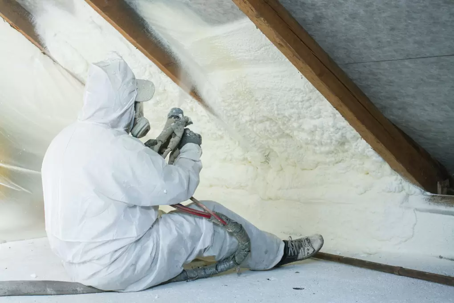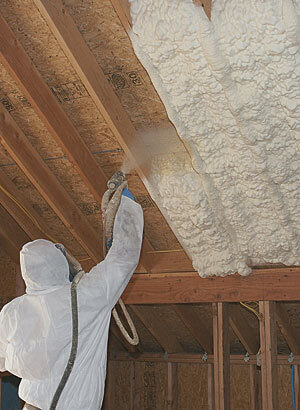Typical Misconceptions Regarding Spray Foam: Debunking the Misconceptions
Typical Misconceptions Regarding Spray Foam: Debunking the Misconceptions
Blog Article
Spray Foam: The Ultimate Option for Air Sealing and Insulation
Spray foam insulation has emerged as a leading service for efficient air sealing and thermal insulation, providing a distinct combination of residential properties that set it apart from typical approaches. Comprehending the full scope of its advantages, installation processes, and contrasts with various other insulation kinds is vital for making educated choices.
What Is Spray Foam?
Spray foam is a versatile insulation product that incorporates the concepts of air sealing and thermal resistance to boost power effectiveness in structures. Composed largely of polyurethane or other comparable compounds, spray foam is applied as a liquid that broadens upon call with surfaces, creating a solid, continual layer of insulation. This special home permits it to load voids, cracks, and spaces that traditional insulation materials might neglect, providing a remarkable air seal.
There are 2 primary kinds of spray foam: open-cell and closed-cell. Open-cell spray foam is lighter and more flexible, offering excellent noise absorption and a lower R-value per inch - Spray Foam. On the other hand, closed-cell spray foam is denser, supplying a higher R-value, moisture resistance, and added structural integrity to developing elements
The application process normally entails specialized equipment, ensuring a seamless application that abides by numerous substrates, consisting of timber, metal, and concrete. This flexibility makes spray foam suitable for both brand-new constructions and retrofitting existing structures. Its ability to develop an airtight barrier dramatically adds to minimizing energy intake and enhancing interior air high quality, consequently making it a recommended choice amongst contractors and homeowners alike.
Advantages of Spray Foam Insulation
One of one of the most considerable benefits of spray foam insulation is its phenomenal capacity to develop a continual air obstacle, which effectively decreases power loss. Unlike conventional insulation materials, spray foam broadens to fill fractures and gaps, guaranteeing that air leakage is considerably reduced. This characteristic not just boosts energy performance however likewise results in lower utility expenses in time.
Additionally, spray foam insulation offers remarkable thermal resistance, contributing to a much more steady indoor atmosphere. Its high R-value per inch allows for efficient insulation in constrained spaces, making it excellent for attic rooms, wall surfaces, and crawl spaces. Additionally, the moisture-resistant homes of spray foam help protect against mold and mildew and mold growth, promoting much healthier living problems.
One more important advantage of spray foam insulation is its sound-dampening qualities (Spray Foam). It efficiently reduces noise transmission between rooms, developing a quieter and much more comfortable home environment. The sturdiness of spray foam additionally stands apart, as it does not droop or clear up over time, maintaining its performance throughout its life expectancy
Exactly How Spray Foam Works
Recognizing how spray foam insulation works is crucial for valuing its effectiveness in air sealing and thermal resistance. Spray foam insulation contains two main elements: isocyanate and polyol material. When these components are blended, they go through a chemical reaction that causes the material to broaden rapidly, developing a thick foam that fills tooth cavities, cracks, and why not try these out gaps.
As the foam broadens, it follows surfaces, developing an impermeable seal that dramatically lowers air seepage. This characteristic makes spray foam insulation highly effective at protecting against drafts and moisture infiltration, which can bring about energy loss and damage in time. Furthermore, the closed-cell variation of spray foam uses exceptional thermal resistance as a result of its rigid structure, properly reducing heat transfer.
The distinct buildings of spray foam enable it to comply with uneven surfaces, ensuring detailed coverage and a seamless obstacle. Consequently, spray foam insulation not just boosts energy performance but additionally contributes to boosted interior air top quality by minimizing the build-up of irritants and contaminants. Eventually, understanding the mechanics behind spray foam emphasizes its role as a superior choice for insulation and air securing in both industrial and property applications.
Installment Refine Overview

Before setup, the room should be continue reading this properly cleansed and prepped, making sure that surfaces are devoid of particles, dust, and moisture. Due to the fact that pollutants can jeopardize attachment and total efficiency, this step is vital. When the area is prepared, the application entails blending the 2 elements of the spray foam, which increases upon get in touch with and fills up gaps properly.
Trained specialists ought to carry out the installation, making use of customized equipment to make certain consistent insurance coverage and ideal thickness. Safety safety measures, including wearing safety equipment and guaranteeing correct ventilation, are vital throughout this procedure. After application, the foam generally cures promptly, creating a solid obstacle that enhances power effectiveness.
Contrasting Spray Foam to Conventional Insulation
When evaluating insulation options, spray foam insulation stands out in contrast to traditional products such as fiberglass and cellulose. Unlike fiberglass and cellulose, which can enable air infiltration, spray foam broadens upon application, filling spaces and gaps to produce an airtight seal.
Furthermore, spray foam provides a higher R-value per inch than typical insulation kinds, using more reliable thermal resistance in a thinner profile. This characteristic is especially helpful in spaces with limited tooth cavity depth. Furthermore, spray foam is resistant to moisture and mold and mildew growth, which can be a considerable issue with cellulose and fiberglass, especially in moist environments.
Nevertheless, spray foam insulation normally carries a greater upfront price than its traditional counterparts. House owners should weigh this preliminary financial investment versus long-lasting energy savings and performance benefits. Eventually, while both insulation types serve their objective, spray foam becomes a more advanced remedy for modern insulation demands, particularly in regards to air securing and thermal efficiency.

Final Thought
In summary, spray foam insulation stands for a highly effective remedy for accomplishing ideal air securing and thermal resistance. Its special buildings, consisting of moisture resistance and sound dampening, make it appropriate for various applications in both brand-new building and constructions and retrofitting tasks (Spray Foam). Although the initial expenses may be higher contrasted to standard insulation materials, the lasting benefits, such as considerable power financial savings and boosted indoor air top quality, warrant the investment and underscore its value in modern building methods.
Spray foam insulation has arised as a leading remedy for efficient air sealing and thermal insulation, providing an unique combination of homes that establish it apart from conventional methods.Spray foam is a flexible insulation product that integrates the principles of air securing and thermal resistance to improve energy effectiveness in buildings.When reviewing insulation options, spray foam insulation stands out in comparison to conventional products such as fiberglass and cellulose. Inevitably, while both insulation kinds serve their objective, spray foam arises as a much more advanced solution for modern-day insulation demands, specifically in terms of air sealing and thermal performance.
In summary, spray foam insulation represents a highly reliable service for accomplishing ideal air securing and thermal resistance.
Report this page